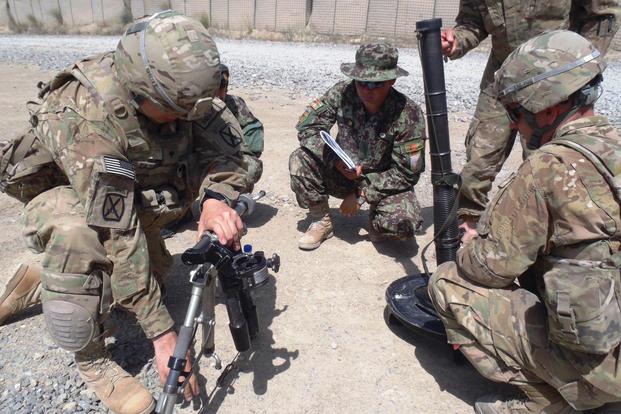U.S. Army advisers with the 1st Security Force Assistance Brigade (SFAB) in Afghanistan have learned they may want to focus more on training Afghan forces how to fight with mortars.
That's one of the findings on SFAB operations the service is starting to compile, said Army Secretary Mark Esper, who recently visited SFAB teams in Afghanistan.
"I traveled over to Afghanistan this summer and spent a lot of time with the SFAB," he told reporters Wednesday at a Defense Writers Group breakfast.
Esper added that the Army is "very satisfied with the performance of the SFAB [units]; they were doing exactly what they were expected to do and performing well."
The 1st SFAB -- stationed at Fort Benning, Georgia -- deployed to Afghanistan in March. In February 2017, the Army announced its plan to stand up six of these specialized brigades to take over advise-and-assist missions with friendly nations so combat brigades in the operational force could focus on preparing for war.
"What I was actually surprised by is that we got as much right as we did in terms of the equipping, training, etc.," Esper said. "I think what the teams told me is, they probably next time need to deploy forward in that environment more knowledge of the employment and use of mortars. We sent people with artillery backgrounds, but mortars are much more commonly used by the Afghans, and so the ability to advise on the employment of mortars is one thing."
Logistics operations have proven to be "one of the highest payoff areas" in Afghanistan, he added. "The Afghan logistics and maintenance base is not as robust as it should be to support their operations. We have logistics teams out there now, but I think another lesson learned is we need probably more teams to go and assist the Afghans."
Esper stressed that these lessons learned apply only to Afghanistan.
"There are a number of things like that. Nothing was a showstopper, but I think they were good lessons learned in the context of the Afghanistan working with the Afghans," he said. "In a different scenario, with a different force we are supporting, it may be different."
In addition to the 1st SFAB, the 2nd SFAB is stationed at Fort Bragg, North Carolina. The Army has also announced that the 3rd SFAB will be stationed at Fort Hood, Texas; the 4th SFAB at Fort Carson, Colorado; and the 5th SFAB at Joint Base Lewis-McChord, Washington.
-- Matthew Cox can be reached at matthew.cox@military.com.










